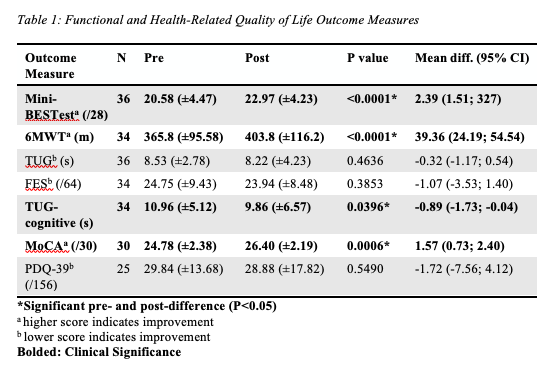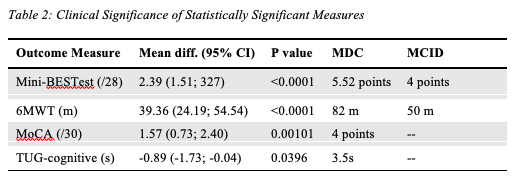Objective: This study aims to determine if the functional outcomes and HRQoL improve after an 8-week group exercise and education program.
Background: Patients with Parkinson’s Disease (PD) are often referred to physiotherapy as evidence suggests that exercise can help people with PD, especially in early disease [1]. However, there is no consensus in the literature as to what type of exercise or education is most beneficial for functional outcomes or improving health related quality of life (HRQoL) [2][3].
Method: This is a prospective, before and after study set in an outpatient rehabilitation department in an Irish hospital. Thirty-six patients have participated in a multidisciplinary program designed by multiple clinical specialists in PD. The subjects participated in an 8-week group exercise program with one additional week before starting, and one additional week after ending the program, for outcome measure assessment. The primary outcome measures were the Mini-BESTest, Six-Minute Walk Test (6MWT), Timed Up and Go (TUG), TUG (cognitive), Montreal Cognitive Assessment (MoCA), Parkinson’s Disease Questionnaire 39 (PDQ-39) and Falls Efficacy Scale (FES). Other outcomes, such as medications prescribed for Parkinson’s symptoms, and goal attainment were included.
Results: The Mini-BESTest, 6MWT, TUG, and MoCA showed statistical improvement (P<0.001) after the intervention [table 1]. However, none of the measures showed a minimal clinically important difference (MCID), which is the amount of change necessary to be clinically important to the patient [table 2]. Qualitative analysis of self-reported goal attainment and goals yet to achieve suggest that this type of exercise program subjectively improved participants’ knowledge of their condition and confidence in daily activities.
Conclusion: An eight-week exercise and education program appears to offer statistically significant improvements in measures of balance, mobility, and cognition. Further research should be done to determine what aspects of an education and exercise program make the most clinical improvements in people with Parkinson’s Disease to aim to further help people maximize their functional independence and HRQoL.
References: 1. Domingos J, Keus SHJ, Dean J, de Vries NM, Ferreira JJ, Bloem BR. The European Physiotherapy Guideline for Parkinson’s Disease: Implications for Neurologists. J Parkinsons Dis. 2018;8(4):499-502. 2. Tomlinson CL, Herd CP, Clarke CE, Meek C, Patel S, Stowe R, et al. Physiotherapy for Parkinson’s disease: a comparison of techniques. Cochrane Database Syst Rev. 2014(6):Cd002815. 3. Keus SH, Bloem BR, Hendriks EJ, Bredero-Cohen AB, Munneke M. Evidence-based analysis of physical therapy in Parkinson’s disease with recommendations for practice and research. Mov Disord. 2007;22(4):451-60.
To cite this abstract in AMA style:
S. Schwartz, M. Twomey, A. Grover, T. Clifford, S. O'Sullivan. Functional Outcomes Following a Group Exercise and Education Program in Patients with Parkinson’s Disease [abstract]. Mov Disord. 2021; 36 (suppl 1). https://www.mdsabstracts.org/abstract/functional-outcomes-following-a-group-exercise-and-education-program-in-patients-with-parkinsons-disease/. Accessed December 14, 2025.« Back to MDS Virtual Congress 2021
MDS Abstracts - https://www.mdsabstracts.org/abstract/functional-outcomes-following-a-group-exercise-and-education-program-in-patients-with-parkinsons-disease/


